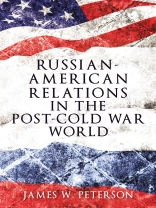Why did the Russian take-over of Crimea come as a surprise to so many observers in the academic, practitioner and global-citizen arenas? The answer presented in this textbook is a complex one, rooted in late-Cold War dualities but also in the variegated policy patterns of the two powers after 1991.
The 2014 crisis was provoked by conflicting perspectives over the Balkan Wars of the 1990s, the expansion of NATO to include former communist allies of Russia as well as three of its former republics, the American decision to invade Iraq in 2003, and the Russian move to invade Georgia in 2008. This book uses a number of key theories in political science to create a framework for analysis and to outline policy options for the future. It is vital that the attentive public confront the questions raised in these pages in order to control the reflexive and knee-jerk reactions to all points of conflict that emerge on a regular basis between America and Russia.
Inhoudsopgave
Introduction: from Cold War to Crimea: a bumpy road
1 Theoretical approaches: models of power, systems theory, critical junctures, legacies, realism, and realism revised
2 Cold War root of post-Cold War tension: duality of détente in the 1970s and neo-Cold War in the 1980s
3 Imbalance of power in 1991: collapse of the Soviet Union and allied victory in the Persian Gulf War
4 Making different choices in the Balkan Wars of the 1990s: Bosnia in 1992–5 and Kosovo in 1999
5 Admission of twelve former-communist states and republics into NATO and the bitter Russian reaction, 1999–2009
6 Russia and America confront terrorism, 1994–2004: a foundation of understanding
7 Wars in Afghanistan (2001), Iraq (2003), and Georgia (2008): a mixed set of perceptions
8 Missile shield proposal by the US in 2007–9 and the Arab Spring of 2011: contrasting priorities
9 America and Russia pivot towards Asia: political differences yield to economic rivalry
10 Ukrainian Crisis to the center of the stage in 2014 and after: a game-changing earthquake in the relationship
Conclusion: theoretical approaches and a path from Crimea to stability
Postscript: two eagles
Index
Over de auteur
James W. Peterson is Professor Emeritus in Political Science and Head of the Department of Political Science at Valdosta State University, USA












